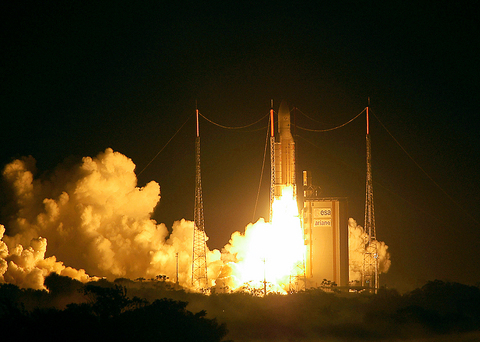An Ariane 5 rocket carrying a 6.5-tonne Thai communications satellite, the heaviest ever, was launched yesterday with the promise of bringing high-speed Internet to the remotest corners of Asia.
Shin Satellite says the orbiter will deliver broadband connections to Asian villages and Australian outback towns that lie far off fibre-optic cable grids, under a footprint that will stretch from India to China to New Zealand.
Worth more than US$400 million, the IPSTAR-1 is the world's largest civilian communications satellite, says the company owned by the family of Thai Prime Minister Thaksin Shinawatra.

PHOTO: AFP
The launch at 0825 GMT, having been delayed from its 0639 GMT launch with 15 seconds left in the countdown because of technical problems.
The launch was broadcast live on Thai television by a government-run station and one owned by Shin Corp, the company that Thaksin founded before he entered politics. Footage showed Thai officials clapping and cheering as the rocket took off and released its booster rockets.
The satellite, built in the United States by Space Systems/Loral, was launched in French Guyana by the European agency Arianespace.
Shin Satellite, along with many analysts and technology watchers, was upbeat about a smooth, on-schedule launch after a series of testing problems pushed back the original 2004 launch.
John Tanner, global technology editor for Hong Kong-based Telecom Asia magazine, said the delays came as no surprise in what was a major technological feat.
"Essentially, IPSTAR-1 is one of the most complex satellites ever designed, with about 10 times as many components as a standard satellite," he said.
"That means more hardware to test, and more anomalies that pop up during the tests. Shin Satellite is playing it very carefully. They only get one shot at this. If the satellite goes up and fails, they're in very big trouble."
KGI Securities' head of research in Bangkok, Pat Pattaphongse said that while some investors were skeptical because of the hiccups and delays, market sentiment was broadly optimistic.
"If you look at the recent share price reaction, I think people are starting to believe it will come through this time," he said.
Shin Satellite shares closed Wednesday at 15.20 baht, up from a five-month low of 13.30 baht on July 20 after the last scheduled launch was postponed.
Shares rose 2.96 percent on July 25, after the company said a technical problem had been fixed and announced the August 11 launch date, and rose by another 2.70 percent on August 8.
Pat said broadband Internet and telephone connections by satellite had broad market potential, especially in remote and rural areas of India and China, where infrastructure lags behind the rapid development seen in cities.
Shin Satellite is targeting two million to four million people across the region, with its satellite expected to stay operational in orbit for 12 years.
The service area covers 14 countries, with data routed through 18 "gateways," similar to switching stations used in telephone systems, that can be adjusted to improve or weaken the signal, the Shin Satellite spokesman said.

Former Nicaraguan president Violeta Chamorro, who brought peace to Nicaragua after years of war and was the first woman elected president in the Americas, died on Saturday at the age of 95, her family said. Chamorro, who ruled the poor Central American country from 1990 to 1997, “died in peace, surrounded by the affection and love of her children,” said a statement issued by her four children. As president, Chamorro ended a civil war that had raged for much of the 1980s as US-backed rebels known as the “Contras” fought the leftist Sandinista government. That conflict made Nicaragua one of

COMPETITION: The US and Russia make up about 90 percent of the world stockpile and are adding new versions, while China’s nuclear force is steadily rising, SIPRI said Most of the world’s nuclear-armed states continued to modernize their arsenals last year, setting the stage for a new nuclear arms race, the Stockholm International Peace Research Institute (SIPRI) said yesterday. Nuclear powers including the US and Russia — which account for about 90 percent of the world’s stockpile — had spent time last year “upgrading existing weapons and adding newer versions,” researchers said. Since the end of the Cold War, old warheads have generally been dismantled quicker than new ones have been deployed, resulting in a decrease in the overall number of warheads. However, SIPRI said that the trend was likely

NUCLEAR WARNING: Elites are carelessly fomenting fear and tensions between nuclear powers, perhaps because they have access to shelters, Tulsi Gabbard said After a trip to Hiroshima, US Director of National Intelligence Tulsi Gabbard on Tuesday warned that “warmongers” were pushing the world to the brink of nuclear war. Gabbard did not specify her concerns. Gabbard posted on social media a video of grisly footage from the world’s first nuclear attack and of her staring reflectively at the Hiroshima Peace Memorial. On Aug. 6, 1945, the US obliterated Hiroshima, killing 140,000 people in the explosion and by the end of the year from the uranium bomb’s effects. Three days later, a US plane dropped a plutonium bomb on Nagasaki, leaving abut 74,000 people dead by the

Indian Prime Minister Narendra Modi is to visit Canada next week, his first since relations plummeted after the assassination of a Canadian Sikh separatist in Vancouver, triggering diplomatic expulsions and hitting trade. Analysts hope it is a step toward repairing ties that soured in 2023, after then-Canadian prime minister Justin Trudeau pointed the finger at New Delhi’s involvement in murdering Hardeep Singh Nijjar, claims India furiously denied. An invitation extended by new Canadian Prime Minister Mark Carney to Modi to attend the G7 leaders summit in Canada offers a chance to “reset” relations, former Indian diplomat Harsh Vardhan Shringla said. “This is a